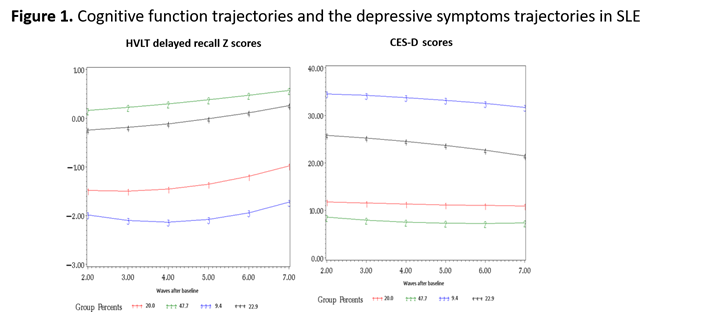Session Information
Date: Sunday, October 21, 2018
Title: Systemic Lupus Erythematosus – Clinical Poster I: Clinical Manifestations and Comorbidity
Session Type: ACR Poster Session A
Session Time: 9:00AM-11:00AM
Background/Purpose:
We have shown that cognitive function followed particular trajectories over time in SLE, with some patients having persistently low scores and others normal scores. This study aims to: 1) describe the association between cognitive function trajectories and depressive symptoms trajectories and 2) identify baseline factors associated with trajectory membership.
Methods: Data were from the University of California San Francisco Lupus Outcomes Study, in which participants are followed longitudinally via annual telephone surveys. The Hopkins Verbal Learning Test-Revised (HVLT-R; measures verbal memory) was administered in years 2-7, providing up to 6 of observation. Age- and education-stratified z-scores were derived for HVLT delayed recall. The Center of Epidemiologic Studies Depression Scale (CES-D: score range 0–60; score ≥ 24 represents depression) was administered yearly.
Combined trajectory modelling for HVLT-R and CES-D was performed. Models with up to 6 classes were assessed. The best model was determined by a combination of clinical plausibility and statistical criteria. Univariate/multivariable logistic regression analyses examined baseline (year 2) factors associated with class memberships, including sex, ethnicity, disease duration, treatments, fatigue, and self-reported disease activity.
Results: 755 patients (mean age 35 ± 13 years at SLE diagnosis) were studied. 4 latent classes were identified: 1-low CES-D scores and low cognitive scores (no depression + cognitive impairment; 20%), 2-lowest CES-D scores and highest normal cognitive scores (no depression + normal cognition; 48%), 3-highest CES-D scores and lowest cognitive scores (depression + cognitive impairment) (9%), and 4-high CES-D scores and normal cognitive score (depression + normal cognition; 23%) (Figure 1).
Table 1 shows the association between baseline variables and membership in classes 2 and 3. Caucasian ethnicity and education were associated with normal cognitive function. SLE disease activity and duration, fatigue, and methotrexate use (reflecting disease activity) were associated with cognitive impairment.
Conclusion: 4 distinct classes of combined cognitive function and the depressive symptoms were identified. Cognitive function was associated with depression status in 32% of patients (class 2 and 3). The results also confirmed that other factors predicted the latent class membership; such as ethnicity, education, disease activity and fatigue. These results highlight different aspects relevant for assessing and managing cognitive function over time in SLE.
|
Table 1. Baseline factors associated with normal cognitive function and absence of depression (comparing class 2 and 3 in univariate and multivariate analysis) |
|||
|
|
HVLT-R delayed recall |
|
|
|
|
Univariate |
Multivariate |
P values |
|
Female |
0.5 (0.2, 1.8) |
— |
|
|
Caucasian |
1.9 (1.1, 3.3) |
5.9 (2.4, 14.7) |
0.0001 |
|
Disease duration, year |
1.0 (0.98, 1.02) |
— |
|
|
Education |
2.2 (1.8, 2.8) |
2.3 (1.6, 3.1) |
<0.0001 |
|
SLE activity |
0.6 (0.5, 0.7) |
0.7 (0.6, 0.8) |
0.0004 |
|
Smoking, ever |
0.8 (0.4, 1.2) |
— |
|
|
Oral glucocorticoids |
0.9 (0.5, 1.5) |
— |
|
|
Methotrexate |
0.6 (0.3, 1.7) |
0.2 (0.06, 0.9) |
0.03 |
|
Plaquenil use |
0.8 (0.5, 1.3) |
0.5 (0.2, 1.02) |
0.06 |
|
Fatigue score |
0.93 (0.91, 0.94) |
0.93 (0.90, 0.95) |
<0.0001 |
|
Tabled values are odds ratios (95% confidence intervals) |
|||
To cite this abstract in AMA style:
Touma Z, Su J, Katz P. Cognitive Function Trajectories Are Associated with the Depressive Symptoms Trajectories in SLE over Time [abstract]. Arthritis Rheumatol. 2018; 70 (suppl 9). https://acrabstracts.org/abstract/cognitive-function-trajectories-are-associated-with-the-depressive-symptoms-trajectories-in-sle-over-time/. Accessed .« Back to 2018 ACR/ARHP Annual Meeting
ACR Meeting Abstracts - https://acrabstracts.org/abstract/cognitive-function-trajectories-are-associated-with-the-depressive-symptoms-trajectories-in-sle-over-time/

